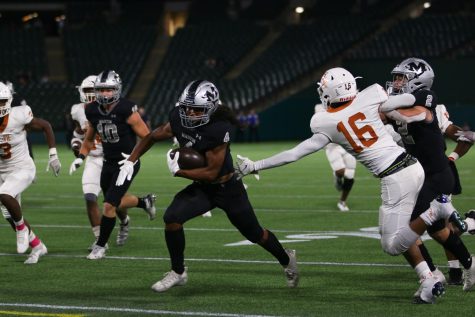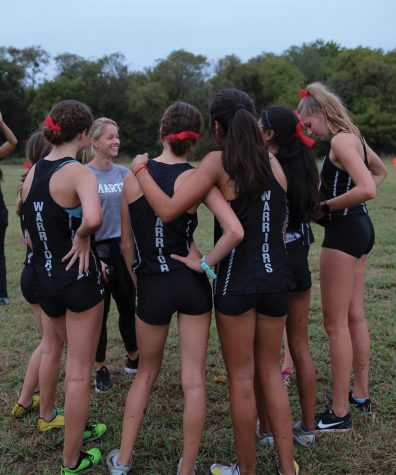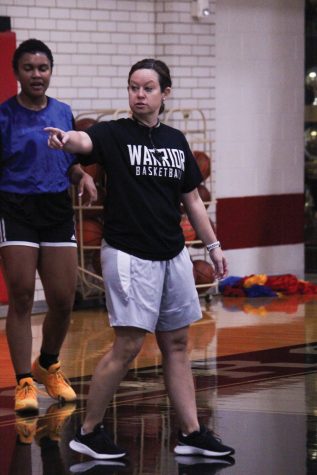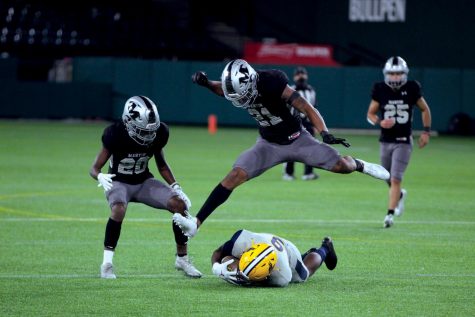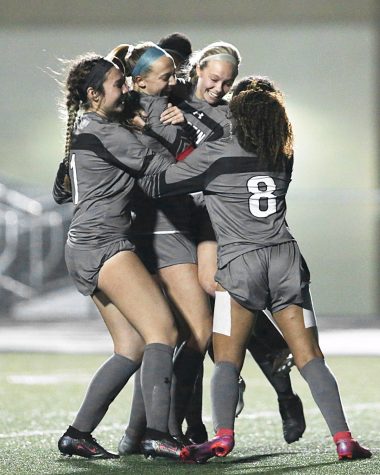Relationships: Teammates and Coaches
November 5, 2021
Relationships between teammates and the relationships between athletes and coaches greatly impact the performance and experience of a team.
“I value honesty and integrity the most, as well as being driven,” Varsity Cheer coach Lindsey Oseguera said. “I enjoy when my athletes have passion for the sport because then they’re much easier to train. It gives me energy when they’re energized and when they’re determined to do their best, as well as giving all of the effort they can.”
This mindset is beneficial for both aspects of athlete/coach relationships and is a vital part of creating a conducive environment for progress. There are also attributes of coaches that their athletes value.
“A coach that includes everyone and makes sure we’re all wanted and can make it a fun environment,” junior volleyball player and cross country runner Desiree Reinwand said.
Athletes strive to be important assets to their team which is best accompanied by a supportive coach.
“Coaches have to be able to not only hold you accountable but listen to what you say,” senior football player Nana Boadi-Owusu said. “An open-minded coach that’s ready to help.”
Although coaches are major contributors to the team, they are not the only party accountable for the uplifting morale. Strong relationships between teammates are also necessary.
“Trust, dependability, and accountability,” Boadi-Owusu said. “Well, in the sport we play, or just me personally, trust is very important in the stuff we do. Like if you don’t trust somebody to do their responsibility on the field, then that can lead to a busted play.”
Each athlete individually must devote their time and be reliable to help build trust within their relationships with their teammates.
“Just knowing that we are going to push each other and be competitive with each other,” Reinwand said.
Teammates value trust, and support, and coaches observe these efforts made by their athletes from their perspective as well.
“I observe teamwork, I observe them sharing a passion for the sport, and I observe them uplifting each other,” Oseguera said. “I know that sometimes they don’t always get along with one another, but at least at practices, I don’t see it.”
Throughout these interactions are life skills that will benefit student-athletes now, and in their futures.
“I think that a life lesson to learn is that you won’t always enjoy all of the people you’re going to work with,” Oseguera said. “But you have to remember the common goal and work through it and succeed in that way.”
Being a teammate reveals who individuals truly are through their actions.
“They show a lot about our character, and I think it’s more enjoyable to be around people who have those values, it makes it more fun,” Reinwand said.
Athletics have the opportunity to bring built-in friends to create memories through these strong relationships as a teammate.
“We always have team dinners every Monday, and they’re a lot of fun,” Reinwand said. “And also for Cross Country, we always hang out after our meets and we just like being around each other.”
In addition to the time athletes dedicate to their sport, many times they also seek to spend time with their teammates outside of practice.
“We’re all really close because of football and the time we’ve spent together in football, we just end up spending a lot of time out of football together too,” Boadi-Owusu said. “It just happens to be that way. Those are the people we see everyday, so we just want to hang out with them.”
Relationships between teammates and coaches will never be perfect, but they can be close when there is equal effort by the athletes and coaches.
“If there’s an unhealthy dynamic, I think that sets the program and team up for failure, so anytime there’s an issue or an unhappiness, I try to address it and squash it as soon as possible because I think that having a positive environment is the utmost important thing within any kind of activity,” Oseguera said. “There must be positivity and there must be a good environment for that.”
Relationships between teammates and the relationships between athletes and coaches greatly impact the performance and experience of a team.
“I value honesty and integrity the most, as well as being driven,” Varsity Cheer coach Lindsey Oseguera said. “I enjoy when my athletes have passion for the sport because then they’re much easier to train because they’re excited and eager to come to practice, rather than kind of like pulling teeth. It gives me energy when they’re energized and when they’re determined to do their best, as well as giving all of the effort they can.”
This mindset is beneficial for both aspects of athlete/coach relationships and is a vital part of creating a conducive environment for progress. There are also attributes of coaches that their athletes value.
“A coach that includes everyone and makes sure we’re all wanted and can make it a fun environment,” junior volleyball player and cross country runner Desiree Reinwand said.
Athletes strive to be important assets to their team which is best accompanied by a supportive coach.
“Coaches have to be able to not only hold you accountable but listen to what you say,” senior football player Nana Boadi-Owusu said. “An open-minded coach that’s ready to help.”
Although coaches are major contributors to the team, they are not the only party accountable for the uplifting morale. Strong relationships between teammates are also necessary.
“Trust, dependability, and accountability,” Boadi-Owusu said. “Well, in the sport we play, or just me personally, trust is very important in the stuff we do. Like if you don’t trust somebody to do their responsibility on the field, then that can lead to a busted play.”
Each athlete individually must devote their time and be reliable to help build trust within their relationships with their teammates.
“Just knowing that we are going to push each other and be competitive with each other,” Reinwand said. “Definitely making sure that we trust each other and how we always uplift each other when we’re doing bad or need help.”
Teammates value trust, and support, and coaches observe these efforts made by their athletes from their perspective as well.
“I observe teamwork, I observe them sharing a passion for the sport, and I observe them uplifting each other,” Oseguera said. “I know that sometimes they don’t always get along with one another, but at least at practices, I don’t see it.”
Throughout these interactions are life skills that will benefit student-athletes now, and in their futures.
“I think that a life lesson to learn is that you won’t always enjoy all of the people you’re going to work with,” Oseguera said. “But you have to remember the common goal and work through it and succeed in that way.”
Being a teammate reveals who individuals truly are through their actions.
“They show a lot about our character, and I think it’s more enjoyable to be around people who have those values, it makes it more fun,” Reinwand said.
Athletics have the opportunity to bring built-in friends to create memories through these strong relationships as a teammate.
“We always have team dinners every Monday, and they’re a lot of fun,” Reinwand said. “And also for Cross Country, we always hang out after our meets and we just like being around each other.”
In addition to the time athletes dedicate to their sport, many times they also seek to spend time with their teammates outside of practice.
“We’re all really close because of football and the time we’ve spent together in football, we just end up spending a lot of time out of football together too,” Boadi-Owusu said. “It just happens to be that way. We’re always seeing each other, so we just hang out out of school together. Those are the people we see everyday, so we just want to hang out with them.”
Relationships between teammates and coaches will never be perfect, but they can be close when there is equal effort by the athletes and coaches.
“If there’s an unhealthy dynamic, I think that sets the program and team up for failure, so anytime there’s an issue or an unhappiness, I try to address it and squash it as soon as possible because I think that having a positive environment is the utmost important thing within any kind of activity,” Oseguera said. “There must be positivity and there must be a good environment for that.”
